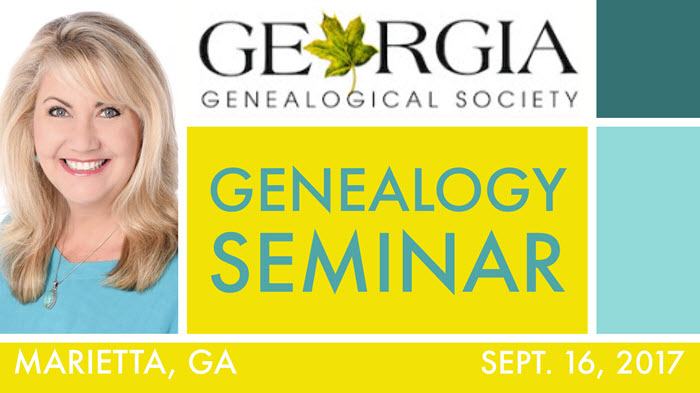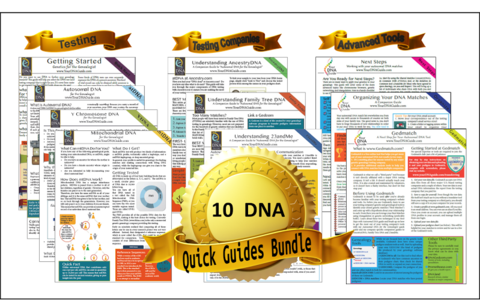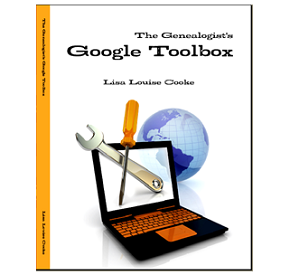by Lisa Cooke | Sep 7, 2017 | 01 What's New, Conferences
The Georgia Genealogical Society is hosting an all-day seminar on September 16, 2017 in Marietta, Georgia. I’m the invited speaker–and you’re invited, too! Come learn cutting-edge skills and tools you can start using in your family history research immediately. Register online until September 12, 2017. You can book me for your genealogy event here.

If you can make it to Marietta, Georgia on Saturday, September 16, I hope you’ll join me for an all-day seminar sponsored by the Georgia Genealogical Society. The event organizers have chosen a well-rounded set of classes I’m excited to teach! You’ll get cutting-edge tips on online search strategies, an in-depth newspaper research class, a unique and fun approach to working a “genealogical cold case,” and inspiring, attention-getting ideas to share your family history discoveries with your relatives.
Georgia Genealogical Society Seminar Details
Here’s what you’ll want to know now about this event:
What: All-Day Seminar with Lisa Louise Cooke
Where: First Presbyterian Church, 189 Church St., Marietta, GA
When: Saturday, September 16, 2017, 9:45 am – 4:15 pm (doors open at 9:15 am for registration)
Hosted by: Georgia Genealogical Society; co-sponsored by Cobb County Genealogical Society
Registration: Register online via PayPal by midnight on Tuesday, September 12, 2017, to get the regular event price and the class handouts.
And boy oh boy are we going to dig into genealogy!:
10:15 am: Google Books: The Tool You Should Use Every Day! Over 25 million digitized and searchable free books are at your fingertips with Google Books. Learn how to make the most of this goldmine chock full of historical data. (This is a brand new class in 2017 and was a BIG hit at Rootstech,)
11:30: Get the Scoop on your Ancestors with Newspapers. Yearning to “read all about it?” Newspapers are a fantastic source of research leads, information and historical context for your family history. Learn the specialized approach that is required to achieve success in locating the news on your ancestors. Includes 3 Cool Tech Tools that will get you started.
(12:30-2:00 pm: Lunch is on your own)
2:00 pm: How to Reopen and Work a Genealogy Cold Case. Become a genealogical detective in this vital session. You’ll learn to track ancestors like a criminal cold case detective, sniffing out holes in your research and getting missing information on the record with cutting edge technology.
3:15 pm: Inspiring Ways to Capture the Interest of Non-Genealogists. If you are researching your family tree but haven’t shared it with your family in a way that sparks their interest, then you are only experiencing half of the joy of genealogy! And if your descendants don’t grasp the importance of their heritage, your hard work may tragically find it’s way to the city dump when you are gone. Don’t just collect your family history and store it away in binders and files! Learn how creative displays and crafts can capture the imagination of your non-historian friends and relatives, while honoring your ancestors. These projects are guaranteed to inspire your family to ask you to tell them more about the family tree!
Click here for more about the event and to register.
4 More Ways to Learn New Genealogy Skills
If you can’t be in Marietta (darn!) on September 16, check out these free options for learning with me and the rest of my team here at Genealogy Gems:
-
- Subscribe to my free weekly e-newsletter. You’ll get my free Google research e-book as a thank you gift. Simply enter your email address into this box, and I’ll deliver news, how-tos and stories from my blog, including my popular weekly update of new genealogy records online.
- Listen to the free Genealogy Gems podcast. My flagship audio show has been delivering in-depth stories, research strategies, tech tips and more for more than 10 years–with more than 2 million times worldwide. Why not listen for yourself?
- Subscribe to my YouTube channel. Watch, learn and be inspired with the many genealogy how-to videos I’ve shared on my YouTube channel.
Thanks for sharing this event invitation with your friends. I hope to meet you in Marietta, on social media or as a new listener or email subscriber!
by Lisa Cooke | Jan 16, 2017 | 01 What's New, DNA
Organize DNA matches with this innovative approach. If you are feeling overwhelmed with your DNA results, you are not alone. Learning to organize your DNA matches in an effective way will not only keep your head from spinning, but will help you hone in on possible matches that will break down brick walls. Here’s the scoop from Your DNA Guide, Diahan Southard.

I can tell whose turn it was to unload the dishwasher by the state of the silverware drawer. If either of the boys have done it (ages 13 and 11,) the forks are haphazardly in a jumble, the spoon stack has overflowed into the knife section, and the measuring spoons are nowhere to be found. If, on the other hand, it was my daughter (age 8,) everything is perfectly in order. Not only are all the forks where they belong, but the small forks and the large forks have been separated into their own piles and the measuring spoons are nestled neatly in size order.
Organize Your Imaginary DNA Drawer
Regardless of the state of your own silverware drawer, it is clear that most of us need some sort of direction to effective organize DNA matches. It entails more than just lining them up into nice categories like Mom’s side vs. Dad’s side, or known connections vs. unknown connections. To organize DNA matches, you really need to make a plan for their use. Good organization for your test results can help you reveal or refine your genealogical goals and help determine your next steps.
Step 1: Download your raw data. The very first step is to download your raw data from your testing company and store it somewhere on your own computer. See these instructions on my website if you need help.
Step 2: Identify and organize DNA matches. Now, we can get to the match list. One common situation for those of you who have several generations of ancestors in the United States, is that you may have ancestors that seem to have produced a lot of descendants. These descendants may have caught the DNA testing vision and this can be like your overflowing spoon stack! All these matches may be obscuring some valuable matches. Identifying and putting those known matches in their proper context can help you identify the valuable matches that may lead to clues about the descendant lines of your known ancestral couple.
In my Organizing Your DNA Matches quick sheet, I outline a process for identifying and drawing out the genetic and genealogical relationships of these known connections. Then, it is easier to verify your genetic connection is aligned with your genealogy paper trail and spot areas that might need more research.
This same idea of plotting the relationships of your matches to each other can also be employed as you are looking to break down brick walls in your family tree, or even in cases of adoption. The key to identifying unknowns is determining the relationships of your matches to each other.
Step 3: See the relationship between genetics, surnames, and locations. Another helpful tool is a trick I learned from our very own Lisa Louise Cooke–that is Google Earth. Have you ever tried to use Google Earth to help you in your genetic genealogy? Remember, the common ancestor between you and your match has three things that connect you to them: their genetics, surnames, and locations. We know the genetics is working because they show up on your match list. But often times you cannot see a shared surname among your matches. By plotting their locations in the free Google Earth, kind of like separating the big forks from the little forks, you might be able to recognize a shared location that would identify which line you should investigate for a shared connection.
So, what are you waiting for? Line up those spoons and separate the big forks from the little forks! Your organizing efforts may just reveal a family of measuring spoons, all lined up and waiting to be added to your family history.
More on Working with DNA Matches
How to Get Started with Using DNA for Family History
Confused by Your AncestryDNA Matches? Read This Post
New AncestryDNA Common Matches Tool: Love It!
by Lisa Cooke | May 22, 2015 | 01 What's New, Records & databases
Every Friday, we blog about new genealogy records online. Might these collections include your ancestors? This week: Civil War stereographs, Dublin workhouse registers, Illinois naturalizations, a Jersey digital archive and Oregon motor registrations and offenses. Don’t miss our Google tip at the end!
CIVIL WAR STEREOGRAPHS. “The Library of Congress has acquired 540 rare and historic Civil War stereographs from the Robin G. Stanford Collection,” says a press release. “The first 77 images are now online, including 12 stereographs of President Lincoln’s funeral procession through several cities and 65 images by Southern photographers showing South Carolina in 1860-61. The images can be viewed in this gallery within the Library’s Prints and Photographs Online Catalog. More images will be added each month, until all are online.”
DUBLIN WORKHOUSE REGISTERS. More than 1.5 million Dublin workhouse registers, 1840-1919 are now searchable for FindMyPast subscribers. Records include both images and transcripts, and may contain names, marital status, occupation, religion, age, birth year, admission year, name of workhouse and (on images) details about family, condition upon admitttance and date left workhouse or died.
ILLINOIS NATURALIZATIONS. Over a half million digitized images are searchable for free at US, Illinois, Northern District Petitions for Naturalization, 1906–1994 at FamilySearch.
JERSEY HERITAGE DIGITAL ARCHIVE. Over 300,000 items are now searchable at the subscription website Jersey Heritage Archives & Collections Online. Featured collections include registration cards of 30,000+ Channel Islanders who were there during the WWII German occupation. You’ll also find Jersey parish records dating to 1842 and (under Superintendent Registrar) parish registers from 1540-1842 and post-1842 civil marriage records.
OREGON MOTOR VEHICLE REGISTRATIONS AND CONVICTIONS for 1911-1946 are now searchable by Ancestry subscribers. Registrations include license number, name and address of the vehicle owner (including county in parentheses), make of car, motor number, model or year of manufacture and type of body. Records of convictions name the offender, date, offense, license number, court, county and the amount of any fines.

Tip of the week: Whenever you look at any record of an ancestor, ask what additional documents, images, video footage or historical material this record points you toward. For example, you might learn from an above record that Grandpa drove a 1935 Auburn Speedster or that a relative suffered from the German occupation on Jersey. Google searches on these niche topics can lead you to a Speedster photograph or historical materials (including footage) on the occupation, like this interview with a survivor of the German occupation. Learn how to search for gems like these in Lisa’s totally-revised, updated 2nd edition of The Genealogist’s Google Toolbox.
by Lisa Cooke | Jul 4, 2018 | 01 What's New, Holidays |
Which of your family do you think of when you celebrate your nation’s birthday? A patriot who fought for freedom? Immigrant ancestors who came to these shores? Your current generation, as it seeks its unique American dream? Or your youngest and the yet-unborn,...
by Lisa Cooke | Jun 11, 2015 | 01 What's New, African-American, Ancestry, Beginner, Census, FamilySearch, History, images, Records & databases, Research Skills, United States

Sample census detail image from Ancestry.com.
Imagine taking a standard U.S. census form, translating it into Spanish, administering it to a newly-American population whose racial identity is highly politicized, translating the results back into English and trying to make sense of them 100 years later.
That’s what happens when you’re looking at 1910 census in Puerto Rico.
I stumbled on this story when my dad, a FamilySearch indexer, called my attention to a current project to index previously-missed parts of the 1910 census. A lot of the missing data was for Puerto Rico. The forms are in Spanish. My dad asked my help translating some of what he was reading, since I speak some Spanish. He was concerned that the computer was interpreting some of the abbreviations in English when they were likely Spanish abbreviations. I looked into it and what I found reminded me of these lessons:

From “The US Census and the Contested Rules of Racial Classification in Early Twentieth-Century Puerto Rico,” by Mara Loveman, in Caribbean Studies, 35:2 (July-Dec 2007), 3-36. Click image to go to the paper.
Always read the record itself and seek to understand it. Don’t just rely on the index! The published images of this census on Ancestry interpret “B” in the race column as “Black,” but a little research (thank you, Google Scholar!) reveals that the census takers entered the race in Spanish–so “B” was for “blanco” (read about it in this academic paper).
When you see someone’s race change over the course of a lifetime, consider the historical context. Puerto Rican census data from the early 1900s “show a population becoming significantly whiter from one census to the next” because of “changes in how race was classified on census returns,” says the same paper. Not only were there changes in the official instructions, but the enumerators increasingly didn’t follow them. In fact, on several thousand census entries in 1910 and even more in 1920, “individuals’ racial classifications were manually crossed out, and a different ‘race’ was written in. These post-enumeration edits, it turns out, were done by a select group of Puerto Ricans hired to supervise and ‘correct’ the work of fellow Puerto Rican enumerators.”
 This little historical trivia is not so trivial if you’re wondering why your ancestor may be identified by a different race than you expected. Learn more about finding academic papers like the one quoted here in The Genealogist’s Google Toolbox by Lisa Louise Cooke. Her book shows you how to search Google Scholar for gems like this that make your family history more clear!
This little historical trivia is not so trivial if you’re wondering why your ancestor may be identified by a different race than you expected. Learn more about finding academic papers like the one quoted here in The Genealogist’s Google Toolbox by Lisa Louise Cooke. Her book shows you how to search Google Scholar for gems like this that make your family history more clear!







